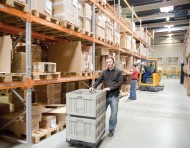 topVOX is a specialist in speech-based Pick by Voice applications for logistics. It is best known as the manufacturer of the VOXter hardware system for speech recognition and Lydia®, the sophisticated speech-controlled picking system, which it has offered worldwide since 2006, and is the most successful voice suite in Europe.
topVOX is a specialist in speech-based Pick by Voice applications for logistics. It is best known as the manufacturer of the VOXter hardware system for speech recognition and Lydia®, the sophisticated speech-controlled picking system, which it has offered worldwide since 2006, and is the most successful voice suite in Europe.
topVOX continues to innovate, and recently launched a new generation of speech terminals, the new VOXter Elite Edition, combining a higher technical spec with a revolutionary one-button design, longer battery life and ease of use. topVOX have also added new Plug & Play features to the Lydia® suite, so it can be integrated with little effort into users’ existing IT infrastructure.
Over the years, topVOX’s implementation of voice in clients’ warehouses has optimised workflow and increased both productivity and accuracy, resulting in significant cost reductions. topVOX’s solutions incorporate voice recognition into logistic processes to free employees from needless work, hands-free from paper tickets or barcode devices, and eyes-free from reading or orientation work.
topVOX’s expertise extends beyond hardware and associated devices they produce. They place the utmost importance on customer satisfaction and offer a complete scope of services from concept design, realisation, provision of hard- and software up to installation, training and maintenance. TopVOX’s recent major project customers include Netto, the discount food retailer and MACO Door & Window Hardware, a world leading manufacturers of window and door fittings based in Salzburg, Austria, but with UK production in Sittingbourne, Kent. Andreas Finken, President of topVOX US, spoke to Warehouse & Logistics News.
Warehouse & Logistics News – Andreas, we last spoke nearly a year ago. What has changed at topVOX since then?
Quite a lot, actually. We brought a new mobile voice computer, the Voxter EliteEdition, to market this spring. It sets a new standard in voice applications. In addition, the new release Lydia 7.0 has been available since May 2012. We have included additional interesting features with it.
WLN – You said last time we spoke that the last recession did not impact topVOX because your voice systems helped your customers achieve greater quality and efficiency in their processes, regardless of the economic situation. Is that still the case?
Yes, it is. Regardless of the current economic situation, the demand for our voice solutions still remains high. On-time delivery and order accuracy are currently a high priority in the global logistics market, and with our mobile solutions we make it possible to achieve these goals.
WLN – How strong is demand in the UK for Voice products, compared with the rest of Europe?
The demand for Voice products in the UK is high, comparable to the other large European economic powers.
WLN – Can you talk us through the new Voxter EliteEdition speech terminals?
With the Voxter EliteEdition we have expanded our successful hardware range to include a high performance mobile voice computer. The design takes in the latest in ergonomic standards. The Voxter EliteEdition is small, robust and easy to handle so employees can carry it comfortably.
WLN – How different are they from other speech terminals?
The Voxter Elite is currently the smallest and fastest voice computer on the market. It is ideally equipped for speech-based picking in harsh working environments.
WLN – I understand the Voxter Elite has a one-button design, the on-off switch. How are all the other functions controlled, such as volume and speed?
Yes, in fact the Voxter EliteEdition only has an on-off switch. All other functions such as registering the start of an employee’s shift and program selection are controlled by voice. By using appropriate service commands, staff can control the voice output’s speed and volume level and enquire about battery level, for example. Thanks to speaker-independent recognition the voice control works perfectly. Employees are no longer interrupted during their work by having to press buttons to operate the device.
WLN – What operating environments is the Voxter EliteEdition designed to work in?
We developed the Voxter EliteEdition placing an emphasis on a robust and efficient terminal. We designed it for IP 67 specification, which means it is both waterproof and dustproof so it can work in any environment. It is also designed to work in temperatures below -30° C. And it is also drop-tested onto concrete. This means it can work in anybody’s environment.
WLN – Are you still offering the original Voxter terminals?
We will continue to offer the previous Voxter version for our existing customers who value a homogeneous hardware platform. We offer our new customers the latest hardware development, naturally.
WLN – When did you launch Lydia in the UK? How is it doing?
We started our first project in the UK in 2007 when one of our international customers introduced Lydia into its British operations. That project continues to work well.
WLN – How does Lydia work?
 Lydia®, technologically speaking, is the world leading system for voice-directed and ergonomic work processes. The hands-free/eyes-free approach guarantees maximum focus from your warehouse staff on productive activity rather than on manual recording activities as with paper-based and traditional RF processes. Employees can therefore move around the warehouse more quickly and productively, which increases work efficiency, quality and accuracy. The use of only a few voice commands along with consistent workflow means users become familiar with the software in the shortest time possible. Thanks to our speaker-independent voice recognition, no additional voice training is required. This means that even temporary and seasonal workers are able to use Lydia® and be productive in a matter of minutes.
Lydia®, technologically speaking, is the world leading system for voice-directed and ergonomic work processes. The hands-free/eyes-free approach guarantees maximum focus from your warehouse staff on productive activity rather than on manual recording activities as with paper-based and traditional RF processes. Employees can therefore move around the warehouse more quickly and productively, which increases work efficiency, quality and accuracy. The use of only a few voice commands along with consistent workflow means users become familiar with the software in the shortest time possible. Thanks to our speaker-independent voice recognition, no additional voice training is required. This means that even temporary and seasonal workers are able to use Lydia® and be productive in a matter of minutes.
WLN – How does it compare with other voice-directed systems?
Lydia® does not require individual speech templates for each user. The system is based on the most up-to-date voice recognition technology. Any speaker, regardless of gender, dialect or accent, can be recognised immediately without any prior speech training. Therefore, any employee can be productive with the system within minutes, saving both time and money.
Lydia® runs on most mobile computers with Microsoft Windows CE, Windows Embedded, Windows XP, or Windows 7, even when using different devices in the same application, providing they are voice enabled. This is a considerable advantage for integration, maintenance and hardware upgrades. Over 50 devices from various manufacturers have already been approved for use with Lydia®.
WLN – Can you tell us about Lydia’s new Plug & Play feature? How much easier does it make Lydia to use? What size organisations is it aimed at?
Lydia®-Plug & Play is a preconfigured out-of-the-box package for voice picking applications for up to 25 users. All necessary components for a simple and successful upgrade to a “speaking warehouse” are already included, such as software, hardware and go-live services.
The simple plug & play package is based on standard components and processes. It makes implementing voice picking extremely easy, as well as very affordable. It especially offers small and medium sized businesses the opportunity to benefit from voice directed processes.
In addition, Plug & Play is highly configurable so that customer-specific requirements can be met simply through configuring the default settings. This makes Plug & Play really easy to implement.
WLN – What are the steps from initial enquiry to delivery of Voxter and Lydia? How long does it take?
As soon as our customers have decided on using Lydia, it goes very quickly. We put our Plug & Play solution into operation within one day.
WLN – Do you have ‘show sites’ where potential customers can go for reference visits and see your Voice systems in action?
Our experience has shown that purely demo warehouses are not sufficient to test the performance of a voice system. This works best on-site at our customers, since Lydia can then show them its full potential under live conditions. What’s more, soft decision factors such as service and maintenance, and the execution of commissioning are important for our potential customers. During a reference visit they receive information right from the source, from customer to customer, so to speak.
WLN – Which different scanners and PDA’s do you supply as part of your solutions?
In addition to our own hardware series, Voxter and Voxter-Scan, we offer the latest voice-capable devices and barcode scanners from all major international hardware producers. These include Motorola, Honeywell Datalogic, HP and Intermec. Our customers can choose the hardware that best suits them.
WLN – What kinds of increases in picking efficiency and quality can you achieve with your Voice systems?
Increases in process efficiency and process quality really depend on the old system being replaced by the voice system. We have clients who reach efficiency increases of over 50% and quality improvements of over 100%. Growth rates are on average in the double-digit percentage range.
WLN – One benefit of your voice suite is something called speaker-independent recognition (SIR). Can you explain what that is and the benefits it brings to a user organisation?
Our speaker-independent recognition allows all employees to work with Lydia immediately and without speech training. Even changes in voice, such as when one has a cold, are not a problem for Lydia.
The real benefit for our customers comes when they have a need for expanding their staff with seasonal or temporary workers. The new employees can work productively with Lydia within a few minutes at no additional expense or effort. This flexibility is especially appreciated by customers offering seasonal items, who need to double their team’s size to meet peak demand.
WLN – Who heads up your UK operation? Does your Godalming office cover the whole UK?
 Our Godalming office is responsible for the entire United Kingdom. In addition, we run our own sales office in the UK. It is important that we have qualified people at the customer site during the crucial phases of a project. This applies to product introduction and commissioning on site at the customer. Depending on your needs development and distribution takes place through system integrators in the UK.
Our Godalming office is responsible for the entire United Kingdom. In addition, we run our own sales office in the UK. It is important that we have qualified people at the customer site during the crucial phases of a project. This applies to product introduction and commissioning on site at the customer. Depending on your needs development and distribution takes place through system integrators in the UK.
WLN – What size organisations are your target customers – what is the minimum order throughput for which you recommend a topVOX system?
Our voice suite Lydia is freely scalable, so small, medium and large companies can take advantage of the use of voice. We have implemented projects at companies where only five employees work with voice, as well as businesses where well over a thousand employees work with Lydia.
With our current Plug & Play system we’re talking primarily about small and medium-sized companies that, thanks to the pre-configured packages, can quickly and easily go live with voice, even if it is a single user.
WLN – In which UK industry sector are you seeing the adoption of voice technology growing fastest?
When it comes to the introduction of voice-based systems, retailers, wholesalers and logistics service providers are currently still the leaders. However, we’re currently finding that companies like automobile manufacturers are also looking to voice technology for the picking and delivery of assembly components to the assembly line.
WLN – Can you name some of your recent UK clients for turnkey solutions in the UK, and what you do for them?
![]() Just as we did with Pick by Voice, we started our Plug & Play system with commercial enterprises. In that industry, voice solutions are a standard technology, so it isn’t surprising that our turnkey solution was foremost in demand here.
Just as we did with Pick by Voice, we started our Plug & Play system with commercial enterprises. In that industry, voice solutions are a standard technology, so it isn’t surprising that our turnkey solution was foremost in demand here.
We have several clients with turnkey solutions in various industries, including construction, automotive and the more typical large logistics industries. Our most recent Plug & Play client will be publishing a case study soon. So keep an eye out for that.
WLN – Do you supply your products to customers direct or through system integrators?
We offer our voice solutions both directly and through system integrators. Customers specifically looking for a voice application come directly to us. Interested parties who are doing a large scale redesign of their storage and IT infrastructure to incorporate current technology standards often turn to the appropriate full-service providers to integrate our voice solution.
WLN – Last time you mentioned Pick and Go, your Pick by Voice product that connects up with an unmanned forklift terminal. What orders have you had for it?
We currently have a significant demand for Pick and Go from all over Europe. However, the product is still too new to have been used yet with a large group of customers.
WLN – Have you teamed up with any forklift OEMs or distributors to offer Pick and Go as part of their forklift solutions?
Pick and Go is an integral part of our product portfolio that we offer via our partner network, which also includes forklift manufacturers. Establishing a new partnership for the targeted distribution of Pick and Go wasn’t necessary, since we already have a strong team of IT professionals, as well as hardware and automotive manufacturers with our current partners.
WLN – Last time you said the voice-based warehouse is no longer a vision but many customers still had yet to fully exploit its potential for optimising their business performance. How are you helping them to do this?
When we get enquiries regarding voice applications, we go through the process flow that is to be represented by voice with the customer. Customers are often trying to transfer their existing processes 1:1 into the new medium and it is apparent to us, upon closer inspection, that the operations’ efficiency can be increased significantly with small changes. In addition, we find on-site that the customer still uses paper lists for work flow processes around the voice solution with regards to things like receiving, inventory, stock transfer and quality assurance. Consequently, we recommend that these steps be incorporated into the voice process.
WLN – You also mentioned that voice-guided staff management could be used for many other processes beside order picking. You mentioned goods receiving, warehousing, inventory and goods shipping. Are you working with any customers to help them develop new operating practices based on voice?
We have many customers who are themselves inherently innovative thinkers. One example is the development of our Check by Voice solution being used by the TÜV (Technical Standards Organisation) in Switzerland. The traffic experts had heard of the possibility of picking by voice and wondered if this technology could be used for their car inspection processes. We then developed an application together for this checklisting process, which is now productively in use, and you can see it at Logistics Link Live at our stand. We do the same thing with customers who want to optimise the intra-logistics of warehouse picking. We identify the processes and then see how this can best be translated into voice.
WLN – Do you have any figures to show the possible improvements if voice is used in these areas?
With regards to warehouse picking, no standards can be determined for the efficiency and quality improvement. In our experience, the achieved rates will increase in the double-digit percentage range. Furthermore, when we replace a paper process with our voice system, there are also environmental benefits because less paper and toner are used.
WLN – Finally, where do you see topVOX going from here?
With the Voxter EliteEdition and the new release, we have already set two milestones this year and are looking forward to healthy growth. We can see some huge potential, particularly in the UK.
topVOX in the UK: Mr. Phil Oliver
Tel: 01327 261 050
Email: info-uk@top-vox.com




Comments are closed.